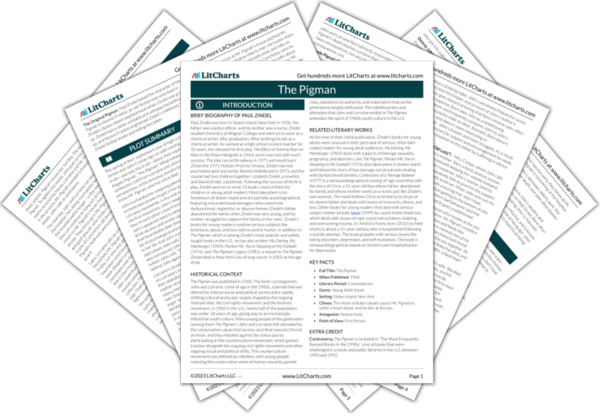Though high school sophomores John and Lorraine might feel that the adults in their life underestimate and talk down to them due to their age, the reality is that they have a lot of growing up to do—in particular, learning to take responsibility for how their actions affect themselves and other people. In fact, The Pigman frames a strong sense of personal responsibility as the defining mark of maturity. At the beginning of the story, John and Lorraine are immature and careless. They have no regard for how their actions affect others, and they blame everyone but themselves for their troubles. For instance, John repeatedly insults any authority figure who tries to tell him off—even if John is in the wrong. John is also a compulsive liar (Lorraine rather euphemistically explains that John “twist[s] things subliminally”)—he blames all kinds of pranks he pulls on the ghost of his Aunt Ahra, and he once told his parents that he hears voices from space inside his head. The circumstances under which the teens meet Mr. Pignati also highlight their immaturity—Mr. Pignati picks up one of their prank phone calls, and John asks him to “donate” to a made-up charity fund.
Lorraine is decidedly more mature than John and has a more developed sense of personal responsibility. However, she, too, demonstrates a lack of personal responsibility by going along with whatever ill-advised schemes John concocts, like lying to Mr. Pignati about the made-up charity fund or throwing a raucous party at Mr. Pignati’s house while he’s at the hospital recovering from a heart attack. And in the end, people close to her suffer the consequences of her passivity: Mr. Pignati overexerts himself dealing with all the stress the teens have put him through with their carelessness and dies of a second heart attack; and when Lorraine’s mother finally learns that Lorraine has been lying to her for months about hanging out with Mr. Pignati, she feels hurt and betrayed. Though of course John and Lorraine aren’t directly responsible for Mr. Pignati’s second, fatal heart attack, they feel they’re at least partly to blame, and it’s the guilt and remorse they feel in response to his death that teaches them that all their actions have consequences. The novel thus suggests that learning how one’s actions affect others is a vital—and unavoidable—part of growing up.
Personal Responsibility ThemeTracker

Personal Responsibility Quotes in The Pigman
The truth and nothing but the truth, until this memorial epic is finished, So Help Us God!
Now Lorraine can blame all the other things on me, but she was the one who picked out the Pigman’s phone number. If you ask me, I think he would have died anyway. Maybe we speeded things up a little, but you really can’t say we murdered him.
Not murdered him.
I blame an awful lot of things on the ghost of Aunt Ahra because she died in our house when she was eighty-two years old.
“You’re ruining your lungs with that thing” was the first remark out of her mouth besides a cough from a misdirected puff from my cigarette. She sounds just like her mother when she says that.
“You never wanted to visit lonely people before, or is it that you only like lonely people who have ten dollars?”
“You think you’re the perfect headshrinker with all those psychology books you read, and you really don’t know a thing.”
I don’t happen to buy all of Lorraine’s stuff about omens. She talks about me distorting, but look at her. I mean, she thinks she can get away with her subliminal twists by calling them omens, but she doesn’t fool me.
As I watched her I remembered all the times she said how hard it was to be a nurse—how bad it was for the legs, how painful the varicose veins were that nurses always got from being on their feet so much. I could see her standing under the street light… just standing there until the bus came. It was easy to feel sorry for her, to see how awful her life was—even to understand a little why she picked on me so. It hadn’t always been like that though.
I had become a disturbing influence, as they say. If I light up a cigarette, all my mother’s really worried about is that I’m going to burn a hole in the rug. If I want a beer, she’s worried I’m not going to rinse the glass out.
I really did think Mr. Pignati would have wanted us to have a few friends over. Of course, he would have liked to be there so he wouldn’t feel he was missing anything. I knew how much he’d enjoy hearing about a party when he came home. He’d want to know every little detail, just like he asked about everything we did in school.
Several other broken pigs were laying all over the floor, and the only thing I could think of at that moment was the proud and happy look on Mr. Pignati’s face when he had shown us the pigs that first day.
I wanted to phone him and say, Mr. Pignati, we didn’t mean things to work out like that. We were just playing.
Playing
Our life would be what we made of it—nothing more, nothing less.











